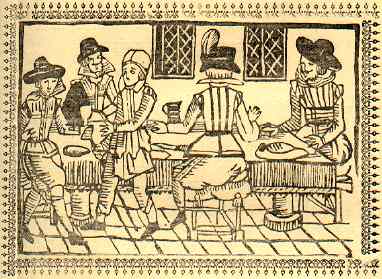A tavern meal
The tavern pictured here is catering for the wealthy, providing food and drink --a jug of beer or ale, served by a tapster. For the less affluent there were alehouses, where "cakes and ale*" were served. The alehouse became a centre of social interaction as churches* became more puritanical. (Shakespeare parodies* the tendencies of puritanism in Twelfth Night.) Patrons enjoyed songs (see below) as well as games, both outdoor and indoor, some of which no doubt involved gambling: dice, shove-groat, tick-tack*, skittles, and card-games (see the next page).
Some alehouses certainly offered more than cakes and ale. Pompey, in Measure for Measure calls himself a tapster, but is also a bawd; and there were constant accusations that criminals planned their nefarious activities in alehouses. The writers of the "coney-catching" pamphlets tell many stories where the innocent traveller is fleeced as the result of an alehouse plot. Crooked or not, many alehouses offered rooms for travellers and new arrivals in town, possibly as crude as the house where the owner was charged with "lodging strange men in his bed with him and his wife."
Click to hear a conversation* with Falstaff, Shakespeare's most famous tavern denizen.
The musical tavern
Drinking songs preserve some sense of the vitality of the taverns and alehouses. In Henry IV, Part Two, the old justice Silence begins to sing (drunkenly). One song is "Mounsieur Mingo"* (see 5.3.73-76), a drinking song written by a Flemish composer whose name is most commonly spelt Orlando di Lasso (1530-1594). Many tavern songs were "catches," or rounds, often with a bawdy meaning hidden in the third or fourth part where it would be difficult to hear. An example given here is by Thomas Ravenscroft, and was published in 1611--"He That Will an Alehouse Keep."
Click to hear a rendition of this song:
Footnotes
-
Cakes and ale
"Dost thou think that because thou art virtuous, there shall be no more cakes and ale?" (Twelfth Night, 2.3.116-17). Ale was the older drink, made from malt, water and spices; beer was made with the addition of the relatively new preservative and flavouring, hops. Click for a recipe.
-
Competing with the Church
Weddings, official and unofficial, and funerals were celebrated with a pot of beer, and as the church increasingly rejected the old folk festivals--such as May Day and Midsummer--the celebrations and music moved to the local pub.
-
Puritans vs. revellers
Malvolio, in Twelfth Night, accuses Sir Toby Belch and his cohorts of keeping his mistress awake: "Do you make an alehouse of my lady's house, that ye squeak out your coziers' catches [cobblers' rounds] without any mitigation or remorse of voice?" (Shakespeare, parodying Malvolio as a puritan, catches his pedantic speech, modelled on the rhythms of the Bible).
Click for the words of another drinking song.
-
Tick-tack . . .
. . . or tick-tack-toe, played with coloured pegs and a board with holes; the irrepressible Lucio in Measure for Measure uses the game as one of his euphemisms for intercourse, as he laments that Claudio's life "may be thus foolishly lost at a game of tick-tack" (1.2.193-94).
-
"As plentiful as blackberries . . ."
Falstaff has just been exposed as a coward, and Poins presses him to give reasons for his actions. The accent here (as in all passages in the program) is read in Shakespeare's original dialect. The result in this instance is that the pun on "reason" and "raisin" becomes clear, since both were pronounced alike. Listen to the passage:
Click for more on Shakespeare's pronunciation.
-
Mounsieur Mingo
Listen to the song:
Mounsieur Mingo
For quaffing doth pass
In cup, cruse, can or glass:
In cellar never was
His fellow found
To drink profound
By task and turn so round,
To quaff carouse so sound,
And yet bear so fresh a brain
Sans taint or stain,
Or foil, recoil or quarrel
But to the beer or barrel,
Where he works to win his name,
And stout doth stand
In Bacchus' band
With pot in hand
To purchase fame,
For he calls with cup and can
"Come try my courage man to man
And let him conquer me that can,
And spare not,
I care not:
While hands can heave the pot,
No fear falls to my lot.
God Bacchus, do me right,
And dub me knight, Domingo."
